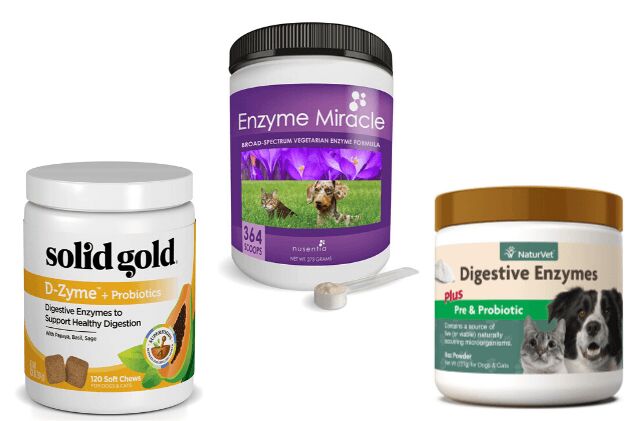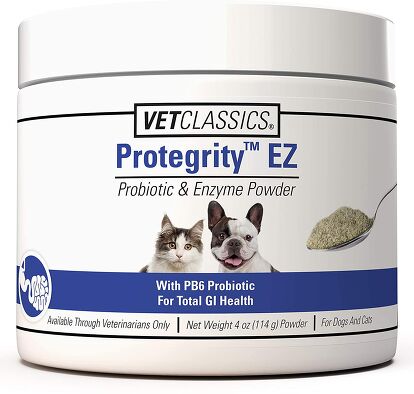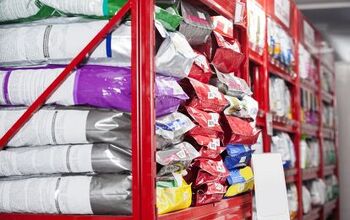Best Dog Digestive Enzymes

Dog digestive enzymes ensure your pooch’s body absorbs all the essential nutrients from the food he eats. For dogs that don’t produce them naturally, supplementation is a must–read on to learn more about when dogs need digestive enzymes and which to choose for your pet.
Your dog’s diet sets up a foundation for their overall health: if they are not getting the right nutrients, they can develop a myriad of health issues. Canine nutrition is a complex topic and there are many different options pet parents choose to go with, from raw food to dry food. What works for some pooches might not work for others, and it’s important to do your research and consult with your vet to come up with the best solution for your pet’s own needs. However, even when you succeed in figuring out the right type of diet for your pet, it’s not always a guarantee your pet will be getting the nutrients he needs. In some cases, like when a dog has digestive disorders or health conditions that influence his digestive health, he might not be able to properly absorb the nutrients he consumes without a supplement. That’s where dog digestive enzymes come into play.
What are dog digestive enzymes?
Dog digestive enzymes are usually produced naturally in your pet’s body. There are three types of digestive enzymes: proteases, which digest proteins, amylases that do the same for carbs and lipases for digesting fat. A healthy, average dog will have no problem producing these enzymes–their production is triggered by chewing, which will release digestive enzymes into the intestines, stomach, and mouth. But what if your pet has a specific health issue that makes this impossible? For some dogs, digestive enzymes are not easy to produce, and in most cases, it’s the damaged pancreatic function to blame. As a result, all the food your pet eats just passes through his system and they don’t absorb any of the nutrients needed for healthy functioning. While it is not very common, this can be dangerous for pets–and it’s important to make sure your pet starts the treatment on time before any real damage has been done.
In the case your pet needs dog digestive enzymes, no need to worry–there are plenty of these supplements to choose from, and your pooch will get a much-needed boost in no time. However, it can be difficult figuring out which dog digestive enzymes really do what they promise and which are not worth your money. To help you find the right match for your dog’s needs and condition, we’ve selected the most popular dog digestive enzymes, recommended both by experts and pet parents alike. Yours is just to pick one from the list that suits your budget and matches your pet’s health issues!
1. Editor’s Choice: Vet Classics Protegrity EZ Probiotic
Formulated to support your pet’s overall digestive health and improve stool consistency, this GI health supplement combines potent probiotics with enzymes and prebiotics to deliver an optimal stomach and intestinal balance. The formula includes a probiotic strain called Bacillus subtilis PB6 for normal stool consistency , fructooligosaccharides to ensure healthy gut bacteria thrives, and a blend of digestive enzymes to work together for overall gastrointestinal support – the combination is a source of alpha-amylase, protease, cellulase, and lipase. You get to choose between powdered form (easy to mix in your pet’s meals) or soft chews which can be doled out as a treat. Manufactured in the USA, this probiotic supplement can be given to dogs and cats over 6 weeks of age – perfect for multi-pet households!
2. Runner Up: NUSENTIA Enzyme Miracle for Dogs
The name ‘enzyme miracle’ is more than well-deserved: this formula includes 11 types of plant-based systemic and digestive enzymes for dogs. It’s truly a huge boost for a digestive system and will ensure your pet gets all the nutrients he needs from his food! The ingredient list includes three dog digestive enzymes and a myriad of other digestion-supporting substances, such as bromelain, cellulase, diastase, peptidase. There are also essential vitamins and minerals in the mix. Made in the USA at FDA and NASC approved facility, this digestive enzyme supplement is a flavorless powder so your pet won’t even know they’re taking it- just mix their dose in their daily meals.
3. Best for Gas: TummyWorks Probiotic Powder for Dogs
Easy to dose and quick to show results, this probiotic powder for dogs packs a powerful punch. The formula includes 10 powerful probiotics, a prebiotic, and 6 digestive enzymes: lactobacillus acidophilus, L. Brevis, L. Casei, L. Rhamnosus, L. plantarum, L. reuteri, L. Fermentum, B. bifidum, B. longum, E. Faecium Digestive Enzymes Protease, Cellulase, Amylase, Lipase, Beta-glucanase, and Bromelain. As a result, this powdered supplement will support your pet’s overall digestive health, give a boost to their immune system, and help with a variety of pesky issues such as diarrhea, bad breath, gassiness, itchiness, etc. Made with the best quality ingredients in the USA in a GMP inspected facility, this supplement is a great choice for dogs and cats both.
4. Best Budget: Petpost Probiotic Powder with Prebiotics & Digestive Enzymes
With each serving, your pet will be consuming 100 million colony-forming units: more than enough to balance out the gut flora and improve their digestion dramatically. However, it’s not just probiotics in the formula that work to optimize your pet’s digestion, but enzymes as well. The formula includes all the key dog digestive enzymes- amylase, protease, lipase, and cellulase to boot. The easy to dose powdered supplement can be mixed in your pet’s food for easier administering–and a little goes a long way, so it’s budget-friendly as well.
5. Best Plant-Based: Zesty Paws Probiotic for Dogs
When it comes to dog supplements, Zesty Paws is one of the most trusted brands, and with good reason- the quality and effectiveness of their products are lauded by pet parents all around the globe. These probiotic chews have over 15,000 reviews and a stellar rating of 4.5 stars – a testament to the efficiency and quality of this dog probiotic. With 3 billion colony forming units with each serving, the potent blend of probiotics and prebiotics in this supplement will eliminate all kinds of stomach discomfort and digestive issues. To boot, the formula also contains plant-based sources of important dog digestive enzymes–papaya and pumpkin. The supplement comes in the form of pumpkin-flavored or chicken-flavored soft chews.
6. Best Clinically Tested: Optagest by InClover
Scientifically formulated and clinically tested to provide optimal GI support, this digestive supplement works fast – and delivers great results. The first effects can be seen only after 1 to 3 days of adding this powdered digestive enzyme to your pet’s food, as it starts working immediately. The key is in its simple yet potent formula which combines USDA organic ingredients, plant-based prebiotics and digestive enzymes to promote a healthy intestinal balance with thriving gut flora and promote better digestion and absorption of nutrients.
This digestive enzyme supplement comes in the form of a tasteless powder, so it’s very convenient to use as you can mix it in any food and your pet won’t be able to tell the difference. It is safe for dogs and cats both – in fact, it can help felines break down hairballs – and contains no filler, preservatives, sugars, grains, or flavors so sensitive pets can also benefit from this supplement. Human-grade and made without any living ingredients, this supplement is highly shelf stable and won’t be affected by heat, oxygen, or water.
7. Honorable Mention: Dr. Mercola’s GI Digestive Enzymes
With human-grade ingredients used in its formula, this GI digestive enzyme supplement by Dr. Mercola is one of the best on the market. Suitable for dogs and cats alike, it contains an animal-based pancreatic enzyme that includes all three dog digestive enzymes (lipase, amylase, protease) as the foundation for the formula. Additionally, there are digestion-supporting enzymes such as papain, bromelain, and Betaine HCL that work together to make sure that digestion and nutrient-absorption go smoothly and flawlessly. It also contains herbs that have been used for years by both animals and humans to support a healthy digestive system. Easy to dose, this supplement powder is ideal for multi-pet households as it can be safely given to cats and dogs both.
Dr. Mercola’s GI Digestive Enzymes are safe for sensitive bellies, too. They are GMO, soy, and gluten-free. It has been formulated to help with occasional gastric distress and support the normal flow of bile for normal waste removal and bowel function. And if it doesn’t work for your pup, don’t worry. There is a 90-day money back guarantee.
8. Also Consider: Well & Good Digestive Enzymes
Don’t let the super affordable price tag fool you- these are some great quality supplements. Not only that it contains a potent blend of prebiotics and probiotics, but this formula also includes dog digestive enzymes from plant-based sources to support your pet’s digestive health fully. With each serving, your pet will be getting circa 95 million colony-forming units that will balance out their gut flora and relieve symptoms of indigestion in no time. The only downside is that it comes in the form of chewable tablets–and if your pet is finicky, ensuring they swallow their daily dose of supplement might prove to be a hassle.
9. Best for Picky Eaters: STRELLALAB Dog Probiotics Treats for Picky Eaters
Made in the USA, these chicken flavored soft chews from STRELLALAB can be used by dogs of all ages and breeds and are loaded with essential pre and probiotics, enzymes and fibre.
These tasty treats were made without the use of sugar, dairy, soy, artificial flavors or preservatives so your picky pup can enjoy a delicious, chicken flavored, healthy supplement that promotes proper digestion, helps to soothe sensitive stomachs and boost immune systems. This 100% natural and organic product features a unique formula that incorporates 5 different probiotics, prebiotics, enzymes and papaya.
10. Best with Pumpkin: Strawfield Pets Store Probiotics for Dogs
Free of gluten, dairy, grain, wheat, soy sugar and salt, this supplement is a great choice to aid with digestion and a handful of other immune system and allergy related issues.
With 5 billion CFUs per scoop, this Strawfield Pet Store probiotics for dogs features a blend of 5 different strains of probiotics, as well as an enzyme blend and delicious pumpkin to help improve your dog’s gastrointestinal health. This is also a great option for dogs experiencing a UTI or a yeast infection. This powder can be mixed into your dog’s food in the morning or evening, regardless of their size or breed.
What are digestive enzymes and does your do need them
As we’ve mentioned, most dogs have no problem producing digestive enzymes on their own. It’s a natural process in the body that occurs when the digestion starts, which means your dog starts releasing digestive enzymes as soon as he begins to chew. Chewing sends a signal for the body to release the enzymes in mouth, stomach, and intestines to promote proper digestion and nutrient absorption, and if you feed nutritionally rich diet (as you should) your pet will have no trouble getting all the vitamins, minerals, and nutrients from his meals thanks to digestive enzymes.
Digestive enzymes break down nutrients into smaller blocks to promote their absorption by the dog’s body and there are different types for different nutrients. In dogs, there are three main enzymes- protease that breaks down proteins into smaller polypeptides or single amino acids, lipase that catalyzes the hydrolysis of fats, and amylase that catalyzes the hydrolysis of starch into sugars. Once your puppy is weaned off, he starts producing these crucial enzymes on his own throughout his life. Healthy dogs produce their own digestive enzyme AND get a boost through nutrition, as well. Some seeds, fruits, and veggies you can give to your pooch naturally contain digestive enzymes and can be beneficial for their digestion: the list includes favorites such as pumpkin, quinoa, flaxseed, papaya, chickpeas, and many others. Fermented veggies and kefir also contain a lot of digestive enzymes and can be a form of a natural probiotic.
So what are dog digestive enzymes in the form of supplements? Does your pet need them, considering that their body already produces it? In a nutshell, most adult healthy dogs don’t need to use digestive enzyme supplements. There are certain cases, though, where dog digestive enzymes are needed and it’s when your pet’s body fails to make them on its own. This means that the pancreas is not functioning properly, and it can happen for a number of reasons.
Canine pancreatitis, or inflamed pancreas in dogs, might be preventing this vital organ from producing digestive enzymes, and in addition to treatment, you might have to introduce supplements. Similarly, canines that suffer from exocrine pancreatic insufficiency (EPI), for example, can’t produce proteases, lipases, and amylases, so they require dog digestive enzymes in the form of supplements. This condition is fairly rare and it most commonly happens in German Shepherds, but all dog breeds (and even cats) can develop this condition.
So to sum it all up, most healthy dogs will produce enough digestive enzymes on their own and won’t require any additional supplements to properly digest food and absorb nutrients from it. In any case, you shouldn’t be introducing dog digestive enzymes into your pet’s diet without consulting with your pet’s veterinarian first. When it comes to diet and digestion, even small mistakes can make a lot of trouble, so it’s crucial to speak with an expert that is acquainted with your pet’s unique situation before making any drastic changes. And if you’re just looking for ways to improve your pet’s digestion, there are alternatives- take a look at dog probiotics if you need something to get your pet’s gut healthy and in optimal form.
What to look for in dog digestive enzymes
Once you’ve figured out that your pooch needs dog digestive enzymes to get all the essential nutrients from his food, the question remains: which dog digestive enzymes should you get? Despite what you may think, not all dog supplements are made alike, and doing your research before you buy can save you money in the long run- and ensure your pet is really getting the right kind of enzymes and not just using a supplement that won’t do anything to help.
Here are some features to pay attention to when buying dog digestive enzymes:
Active ingredients
As we already mentioned, dogs produce three types of digestive enzymes: proteases, lipases, and amylases. However, supplements can also include cellulase, which is an enzyme that is not naturally found in the digestive systems of cats and dogs. This type of digestive enzyme breaks down fibers, and when combined with dog digestive enzymes, it can provide well-rounded digestive support to your pet. Of course, if you are looking for supplements because your pet’s body isn’t producing enzymes naturally, it goes without saying that all three of the crucial enzymes must be part of the ingredient list.
Formula
Most dog digestive enzyme supplements don’t limit themselves to “just” enzymes, but rather contain a multitude of ingredients that are beneficial for your pet’s gut. Their goal is to support proper digestion and these formulas contain a variety of ingredients that could make this happen. Of course, this also means that a lot of the formulas out there won’t be what you’re looking for and that you need to pay attention to the label to see if the ingredients are right for your pet’s requirements. Most blend probiotics with digestive enzymes which can be a great immediate help for upset tummies as well as help your pet build up his immune system and improve digestion in the long run.
Delivery method
If your pet is one of those dogs that eat first and ask questions later, you don’t have to worry about the flavor or the form of the supplements. However, if your pet is a smart cookie or a picky eater, you already know that they won’t eat just any old thing without first inspecting it. That’s why it’s important to adjust the delivery method to a dog’s individual preference — get your pooch the form of supplements you know that they won’t mind eating. Most pooches do just fine with flavored chewables that taste more like a treat than medicine, but if your pet flat out refuses to eat anything that resembles a tablet, a liquid or powder supplement that you can mix in their food is a better option.
How do I know if my dog has an enzyme deficiency?
The lack of digestive enzymes in dogs is usually caused by an underlying medical issue, and it is called exocrine pancreatic insufficiency (EPI). Dogs who have EPI are unable to digest their food properly, and it usually manifests in some of the following symptoms: malabsorption, chronic diarrhea, undigested food in stool, bloating, gassiness, pale and greasy stools, etc. It’s important to note that this is a serious condition, and as such, it should be diagnosed by a veterinarian who will provide the proper treatment for your pet – many symptoms of enzyme deficiency overlap with other medical problems so it’s key to get the right diagnosis as soon as possible.
When should I give my dog digestive enzymes?
Plant-based enzymes such as protease, amylase, and lipase, break down in the stomach thanks to the acidic fluids, so it’s best to feed your pet digestive enzyme supplement right before their meals. More often than not, digestive enzymes come in a powdered form so they can be mixed in meals for easy administering. Not only does this mask the supplement with ease, but it also means it will work as intended and get your pet effective results.
How can I increase my dog’s digestive enzymes?
The pancreas is responsible for producing digestive enzymes – your pet is already doing its job. However, dogs that have certain medical conditions, including exocrine pancreatic insufficiency (EPI) cannot produce digestive enzymes on their own, and will need quality supplementation to replenish them. Plant-based digestive enzymes keep their digestive system in balance and help relieve some of the symptoms of this condition.
What causes a dog to not digest food?
If you’ve noticed that your pet vomits or poops out undigested food, there can be various reasons for it, from EPI to IBD. Often, this leads to malabsorption, when your pet eats and has a voracious appetite but isn’t able to get the nutrients from the food, resulting in bad health and a skinny physique. As there can be many reasons for this issue, and it is a serious problem that can have lasting damaging effects on your dog’s overall health, it is crucial to get your pet to the vet’s office for a complete checkup and proper diagnosis, followed by treatment.
Do digestive enzymes help dogs with allergies?
Yes, indirectly, they do. Digestive enzymes help promote better digestion and nutrient absorption, and in turn, this strengthens the immune system and reduces inflammation, leading to relief in allergy symptoms. Sometimes, symptoms of enzyme deficiency get mistaken for allergies, so when the supplement clears them up, people think that they are helping allergies – but it was actually another issue that’s been pestering your pooch to begin with.
Additional resources:
We are committed to finding, researching, and recommending the best products. We earn commissions from purchases you make using the retail links in our product reviews. Learn more about how this works.

A proud mama to seven dogs and ten cats, Angela spends her days writing for her fellow pet parents and pampering her furballs, all of whom are rescues. When she's not gushing over her adorable cats or playing with her dogs, she can be found curled up with a good fantasy book.
More by Angela Vuckovic

































